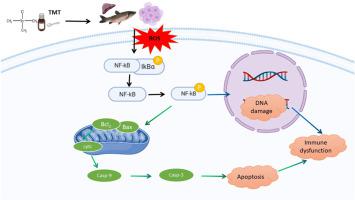Fish & Shellfish Immunology ( IF 4.1 ) Pub Date : 2023-09-24 , DOI: 10.1016/j.fsi.2023.109082 Lulu Li 1 , Meichen Gao 1 , Naixi Yang 1 , Liwen Ai 1 , Liyang Guo 1 , Xuexue Xue 1 , Zunlai Sheng 1

|
Trimethyltin chloride (TMT), a common component in fungicides and plastic stabilizers, presents environmental risks, particularly to fish farming. The precise toxicological mechanisms of TMT in L8824 grass carp liver cells remain undefined. Our study investigates TMT's effects on these cells, focusing on its potential to induce hepatotoxicity via oxidative stress and NF-κB pathway activation. First, we selected 0, 3, 6, and 12 μM as the challenge doses, according to the inhibitory concentration of 50% (IC50) of TMT. Our results demonstrate that TMT decreases cell viability dose-dependently and triggers oxidative stress, as evidenced by increased ROS staining and MDA content. Concurrently, it inhibited the antioxidant activities of T-AOC, T-SOD, CAT, and GSH. The activation of the NF-κB pathway was confirmed by gene expression changes. Furthermore, we observed an increase in cell apoptosis rate by AO/EB staining and cell flow cytometry, and the downregulation of Bcl-2 and the upregulation of Bax, Cytc, Caspase-9, and casp3 verified that TMT passed through the BCL2/BAX/casp3 pathway induces apoptosis. DNA damage was validated by the comet assay and γH2AX gene overexpression. Lastly, our data showed increased expression of TNF-α, IL-1β, IL-6, and INF-γ and decreased antimicrobial peptides, validating immune dysfunction. In conclusion, our findings establish that TMT induces apoptosis and DNA damage via ROS/NF-κB in grass carp liver cells, causing immune dysfunction. This study provides novel insights into the toxicology research of TMT and sheds light on the immunological effects of TMT toxicity, enriching our understanding of the immunotoxicity of TMT on aquatic organisms and contributing to the protection of ecosystems.
中文翻译:

三甲基氯化锡通过ROS/NF-κB诱导草鱼肝细胞凋亡和DNA损伤,导致免疫功能障碍
三甲基氯化锡 (TMT) 是杀菌剂和塑料稳定剂中的常见成分,会带来环境风险,特别是对养鱼业而言。TMT 在 L8824草鱼肝细胞中的确切毒理学机制仍不清楚。我们的研究调查了 TMT 对这些细胞的影响,重点关注其通过氧化应激和 NF-κB 通路激活诱导肝毒性的潜力。首先,根据TMT的50%抑制浓度(IC50),选择0、3、6、12μM作为攻击剂量。我们的结果表明,TMT 会剂量依赖性地降低细胞活力并引发氧化应激,ROS 染色和 MDA 含量增加就证明了这一点。同时,它还抑制 T-AOC、T-SOD、 CAT 和 GSH的抗氧化活性。NF-κB 通路的激活通过基因表达变化得到证实。此外,我们通过AO/EB染色和细胞流式细胞术观察到细胞凋亡率增加,并且Bcl-2的下调和Bax、Cytc、Caspase-9和casp3的上调证实了TMT通过了BCL2/BAX /casp3 途径诱导细胞凋亡。DNA损伤通过彗星试验和γH2AX基因过表达进行验证。最后,我们的数据显示 TNF-α、IL-1β、IL-6 和 INF-γ 表达增加,抗菌肽减少,证实了免疫功能障碍。总之,我们的研究结果表明,TMT 通过 ROS/NF-κB 诱导草鱼肝细胞凋亡和 DNA 损伤,导致免疫功能障碍。该研究为TMT的毒理学研究提供了新的见解,并揭示了TMT毒性的免疫学效应,丰富了我们对TMT对水生生物免疫毒性的认识,为生态系统的保护做出了贡献。






























 京公网安备 11010802027423号
京公网安备 11010802027423号